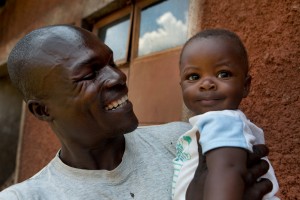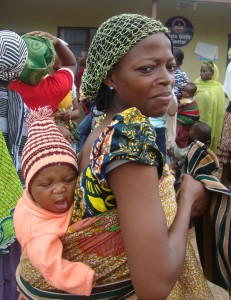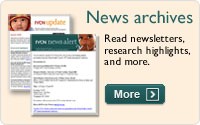
USAID's Infant & Young Child Nutrition Project
Building an enabling environment for improved nutrition
 Prevention of malnutrition requires an enabling environment at the national level as well as in health facilities and communities. Through needs assessments in several countries, we found that national policies often did not reflect current international standards on infant feeding and providers in health facilities and communities lacked up-to-date guidance and tools required to adequately counsel caregivers on feeding children. In addition, program implementers needed practical resources and advice for implementing effective nutrition interventions.
Prevention of malnutrition requires an enabling environment at the national level as well as in health facilities and communities. Through needs assessments in several countries, we found that national policies often did not reflect current international standards on infant feeding and providers in health facilities and communities lacked up-to-date guidance and tools required to adequately counsel caregivers on feeding children. In addition, program implementers needed practical resources and advice for implementing effective nutrition interventions.
IYCN set the stage for stronger nutrition policies and programs by focusing attention on nutrition behaviors and encouraging national adoption of internationally recommended policies, guidelines, and tools. In HIV-endemic areas, the project promoted national policy actions and strategies that are increasing HIV-free survival by helping to prevent mother-to-child transmission of HIV while also increasing a child’s chance of surviving and leading a healthy life.
We also shared the results of our formative research as a foundation for other nutrition programming, encouraged adoption of evidence-based approaches, and regularly disseminated good practices and practical tools among global health stakeholders. As a result, countries, communities, and caregivers have benefited from a more supportive environment for maternal, infant, and young child nutrition programs.
Supporting a country-led shift on breastfeeding in Nigeria
 In Nigeria, the IYCN Project played a key role in supporting national consensus for adopting the World Health Organization 2010 recommendations on HIV and infant feeding. By facilitating discussions and presenting key evidence, IYCN helped convince national leadership not only to adopt the new guidelines, but also to promote breastfeeding as a national strategy to maximize HIV-free survival.
In Nigeria, the IYCN Project played a key role in supporting national consensus for adopting the World Health Organization 2010 recommendations on HIV and infant feeding. By facilitating discussions and presenting key evidence, IYCN helped convince national leadership not only to adopt the new guidelines, but also to promote breastfeeding as a national strategy to maximize HIV-free survival.
Nigeria’s new policy now includes resolute language that instructs health workers to counsel HIV-positive mothers to breastfeed their infants and take antiretroviral drugs—a shift from the former policy, under which health workers were charged with the nearly impossible task of helping mothers choose between breastfeeding and replacement feeding.
Subsequently, the project assisted the government to integrate the policy into a national curriculum for facility- and community-level workers and to develop and disseminate 50,000 copies of a user-friendly brochure to help stakeholders across the country understand the new guidance.
Highlights
- The project significantly expanded evidence available to help policymakers and program implementers understand the role of behaviors in maternal, infant, and young child nutrition and advance nutrition programming by publishing around 35 qualitative assessments from 12 countries, three global literature reviews, and a series of ten user-friendly technical briefs.
- IYCN supported country-led efforts to strengthen 19 nutrition policies and operational strategies that aim to improve maternal and child nutritional status and increase children’s chances of surviving and thriving free of HIV in 12 countries.
- In South Africa, we joined partners in presenting evidence for exclusive breastfeeding and facilitating stakeholder discussions that led the minister of health to declare the country a “breastfeeding nation” in August 2011. The declaration—which signified a turnaround from previous policy recommending formula feeding for HIV-positive mothers—will help to ensure that children are not only protected from HIV but have a better chance of survival.
- Through a broad array of communications efforts, we reached a diverse audience of health and development colleagues across the globe with new knowledge and practical resources for implementing programs. For example, our quarterly newsletter and frequent news alerts reached more than 3,000 subscribers in 130 countries with timely research updates, helpful tools, and program news. The IYCN website served as a nutrition information hub, receiving 70,000 unique visits from thousands of users in 180 countries and territories.
Policy and strategy contributions
Côte d’Ivoire: Minimum Standards of Nutritional Support of Orphans and Vulnerable Children
Ethiopia: National Nutrition and HIV Guidelines
Haiti: National Norms for Safe Feeding of HIV-Exposed Infants and Young Children
Kenya: National Policy on Infant and Young Child Feeding
Lesotho: National Infant and Young Child Feeding Guidelines
Madagascar: Maternal Nutrition Strategy
Malawi: National Community-Based Management of Acute Malnutrition Guidelines; National Strategy for the Prevention of Micronutrient Malnutrition; Operational Strategy to Support the National Infant and Young Child Feeding Policy and Strategic Plan
Mozambique: National Infant Feeding Policy
Nigeria: National Consensus on 2009 WHO Rapid Advice; National Infant and Young Child Feeding Guidelines; National Guidelines on Nutritional Care and Support for Persons Living with HIV; National Operational Guidelines for Community-Based Management of Acute Malnutrition; National Plan of Action on Infant and Young Child Feeding in the Context of HIV/AIDS; National Policy on Infant and Young Child Feeding
Rwanda: Monitoring and Evaluation Plan for the National Multi-Sectoral Strategy to Eliminate Malnutrition in Rwanda 2011–2013
South Africa: Shift from formula feeding to exclusive breastfeeding for the first six months within the context of HIV
Zambia: National Consensus Statement on HIV and Infant Feeding
Photo: PATH/Evelyn Hockstein, Yeside Pikuda

